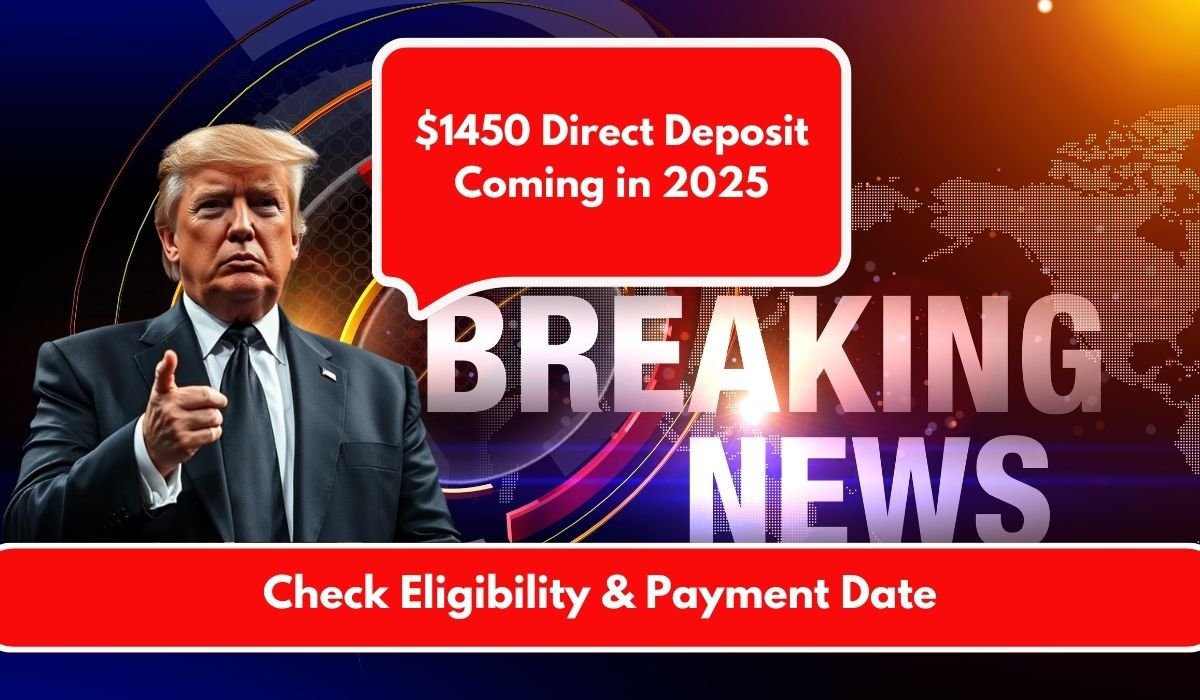Hey there! Got some exciting news to share—a $1450 direct deposit is coming your way in 2025. Sounds like a nice little bonus, right? But before you start dreaming about how to spend it, let’s dive into what it’s all about, who’s eligible, and when you might see the money hit your bank account.
What’s the $1450 Direct Deposit?
So, what exactly is this $1450 deposit everyone’s talking about? It’s a government payment that’s part of a financial support plan for eligible Americans. Think of it as a way to help folks with rising living costs, inflation, or even just to give the economy a little boost.
These types of payments have happened before—like those stimulus checks during the pandemic—and they’re usually meant to ease some financial pressure.
Why Is This Payment Happening?
Well, the cost of living isn’t getting any cheaper, right? Groceries, rent, gas—everything just keeps climbing. The government understands this and wants to help ease the burden.
This $1450 payment is part of a broader economic relief effort planned for 2025. It might be aimed at people who earn below a certain income, families with kids, seniors, or even veterans. The final details are still being confirmed, but the goal is clear: help people stay afloat.
Who Is Eligible?
Now, here comes the million-dollar (or $1450!) question—who gets the money?
You might be eligible if:
- You file taxes regularly in the U.S.
- You meet certain income limits (like low or middle income)
- You receive Social Security, SSI, SSDI, or veteran benefits
- You’re a U.S. citizen or permanent resident
- You’ve received similar benefits in the past, like stimulus checks
If you’re on a fixed income or part of a support program, there’s a good chance you’ll qualify.
The best way to find out? Keep an eye on official IRS or government announcements. And hey, you can always check your IRS account online for updates.
When Will You Get the Payment?
You’re probably wondering—“When’s it coming?” Good question!
Right now, the expected payment window is early to mid-2025. That could mean January, February, or maybe even March. But don’t worry—you won’t have to apply for it manually if you’re eligible. Just like past payments, it will be sent automatically, either through:
- Direct deposit to your bank account
- A paper check if you don’t have direct deposit set up
- Or possibly a prepaid debit card
Make sure your bank details are up to date with the IRS or Social Security Administration to avoid delays.
How to Prepare for It?
Okay, so while we wait, here are a few simple things you can do:
- File your taxes on time in 2024—this helps them decide if you’re eligible
- Update your direct deposit info
- Stay alert for official emails or letters from the IRS (but don’t fall for scams—no legit agency will ask for your info over text or phone)
Also, don’t spend it before it arrives. We know it’s tempting to plan a trip or splurge, but hold tight until it’s actually in your account!
What Can You Use the Money For?
Honestly, it’s your money, so you can use it however you want. That said, here are a few smart ideas:
- Pay off bills or debts
- Build an emergency fund
- Stock up on essentials
- Take care of car repairs or home maintenance
- Or hey, maybe treat yourself a little—everyone deserves a pick-me-up!
Conclusion
The $1450 direct deposit in 2025 could be a lifesaver for many. Whether you’re dealing with high grocery bills, rent stress, or just trying to make ends meet, a little extra help can go a long way.
Keep an eye on updates, stay informed, and get ready—your bank account might just get a happy surprise in the new year.
FAQs
Who qualifies for the $1450 payment in 2025?
People with low to middle income, Social Security recipients, and tax filers are most likely to qualify.
Do I need to apply for this payment?
Nope! If you’re eligible, it should come automatically based on your tax or benefit records.
How will I get the money?
Most people will get it through direct deposit. If not, a check or debit card will be mailed to you.
When will the payment arrive?
Expected in early to mid-2025, though exact dates will be shared by the IRS later.
What if I changed my bank account?
Update your direct deposit info with the IRS or SSA to avoid delays.





